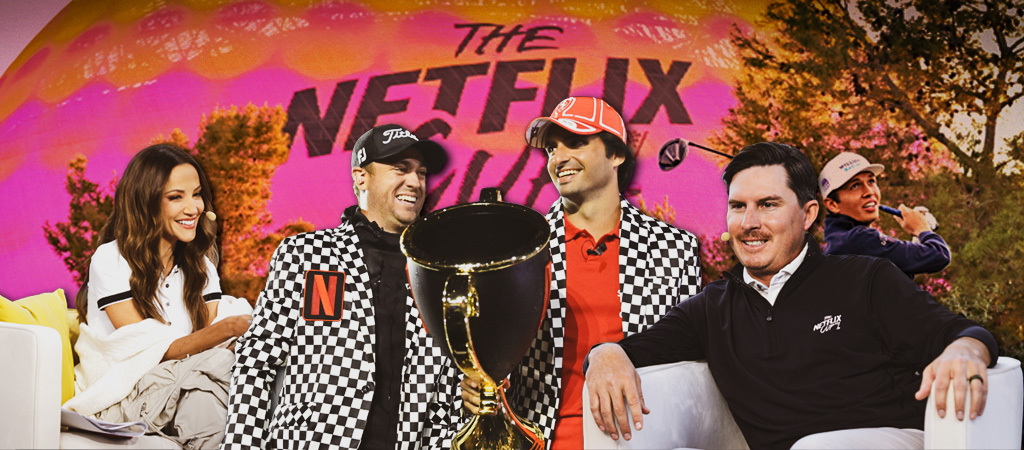LAS VEGAS – It didn’t take long for the Netflix Cup to reveal itself as anything but a typical pro-am golf event. As the pairs (each golfer from the streamer’s Full Swing teamed up with an F1 driver from Drive To Survive) teed off at the first hole, the scramble — literally — was on. The goal was to get the ball in the hole as quickly as possible, and after their first shot, the teams piled into their carts and raced to their next shot.
For golf purists, this probably elicited an eye roll or two, especially at the pristine, perfectly manicured Wynn Golf Club. But for Netflix, their first foray into live sports was an announcement to the world that the plan is coming together.
From Marshawn Lynch on course giving off the wall commentary and interviews to a Squid Game themed red light/green light hole, the eight-hole format moved quickly and had just enough competitive action to keep things moving. There were awkward moments and some technical things still need to be smoothed out, but that’s to be expected after any first-time approach. And host Kay Adams deserves credit for holding it all together throughout the event.
For a platform that traditionally would see users binging Seinfeld and Love Is Blind, it would be easy to stay out of the live sports fray. But there’s a bigger plan in place, and with rumors that Netflix might try to get into the bidding for the NBA In-Season Tournament, case studies like the Netflix Cup allow for rapid testing of the product in real-time. It might not always go well (as seen by the attempted Love Is Blind reunion earlier in the year), but there are learnings to be had from every attempt.
If anything, this puts Netflix one step closer to realizing a vision of a sports version of the Bravoverse, which has served that network well over the years. Bravo Con just concluded in Las Vegas prior to The Netflix Cup’s arrival, and demand for the stars hasn’t waned over the years. Having multiple properties that exist inside the same universe, with the potential for those individuals to show up in other shows, builds a larger world for viewers. And Bravo learned a long time ago that the quickest formula to getting people to care about anything from high-end real estate to cooking was to put personality first, and let stars be themselves (with the benefit of crafty editing and a little bit of mess).
As the pendulum swung from players revealing more of themselves to starting to run and organize their own projects, we’re actually learning less about athletes than before. Access has been chopped as players exact control over documentaries and podcasts. Sure, their personalities bleed through at times, but it’s only one angle of who they are. The Last Dance worked because it was a singular event about a very specific subject who was already larger than life in Michael Jordan. And its launch was only bolstered by it becoming destination viewing during the pandemic when live sports were shut down. The wrong lesson was taken away from that, in that the subjects could determine what was and wasn’t interesting about a project. There have been wins along the way (with The Redeem Team being one of them), but at the end of the day, the old Us Weekly “stars they’re just like us” mantra holds true. Viewers don’t always want a polished, convenient narrative when it comes to players. They want “reality” — even the reality tv version.
Drive To Survive captured that. It found the glitz and glamor of F1 but developed compelling storylines for individual drivers and in the rivalries between them. F1 is the closest thing sports has to a Selling Sunset or a Million Dollar Listing. You’ll see yachts and CEOs and opulence spilling into everything, but there’s fierce competitiveness above all else. And winning is still everything. Full Swing is still finding its footing, but golf was a natural bridge. Athletes can always relate to other athletes, and the “Boardroom” approach has them moving into other industries that fit conveniently into a Sports Bravoverse. And as more players team up and invest in other sports (Pat Mahomes, who produces Quarterback, recently invested in F1’s Alpine team), the cross-contamination is already there for more offerings as long as the perspectives aren’t too closely gatekept by the players themselves.
The Netflix Cup gave us a taste of that. All it took was Carlos Sainz fumbling the cup itself and seeing it smash into the ground that these guys are human, and humans can be silly, or be villains, or be imperfect, or start drama. Letting us into a little mess won’t keep them from being larger than life. It’ll just help us relate to them, and binge more in the process.







